Fascinated by Gallo-Roman history? Click Here to download > > > Here are 6 ways Rome affected France
- Home ›
- Destinations ›
- Paris ›
- Dangerous Areas to Avoid
3 Dangerous Areas in Paris you Should avoid
Updated 1 February 2026 by Leyla Alyanak — Parisian by birth, Lyonnaise by adoption, historian by passion
Yes, you could say there are some relatively dangerous areas in Paris – or at least, areas that are less safe than others. But keep in mind that violent crime is still rare in Paris, especially in daytime. There's no reason to be scared – just aware.
Is Paris safe?
Generally speaking, Paris is a safe city, especially when compared with some other major cities worldwide. But just like other cities (Paris falls somewhere in the middle when it comes to crime) it's good to be aware and careful.
Just know that most violent crime in Paris involves drugs or gangs, and tends to be quite localized in certain suburbs or pockets of town – it rarely occurs where visitors go.
In tourist areas, the greatest danger you're likely to face is the proliferation of pickpockets.
➽ IN A NUTSHELL...
- The city center of Paris is pretty safe, except for scammers and pickpockets
- Most crime in tourist areas targets your belongings, not you
- Crowded areas and subways attract thieves
- A few neighborhoods are fine in daytime but should be avoided at night
- A few parts of Paris have a higher crime rate and should be avoided altogether
- No ENTIRE arrondissement is unsafe, just small parts of a few
Below, you'll find specific details of where to go and what to avoid.
NOTE: Pages on this site may contain affiliate links, which support this site. See full Privacy Policy here.
No-go zones in Paris
No-go zones is a bit of a harsh phrase, but I use it here to signal those areas of Paris that are less safe, at least at certain times.
Paris is divided into 20 arrondissements, or districts. Of these, some are safer than others, but even those considered "sensitive urban areas" aren’t dangerous in their entirety.
Paris also has some 286 suburbs, or banlieues, some of which are not recommended for visitors. However, you’ll have no reason to visit them, unless they have major tourist attractions – and are, consequently, safe during the day.
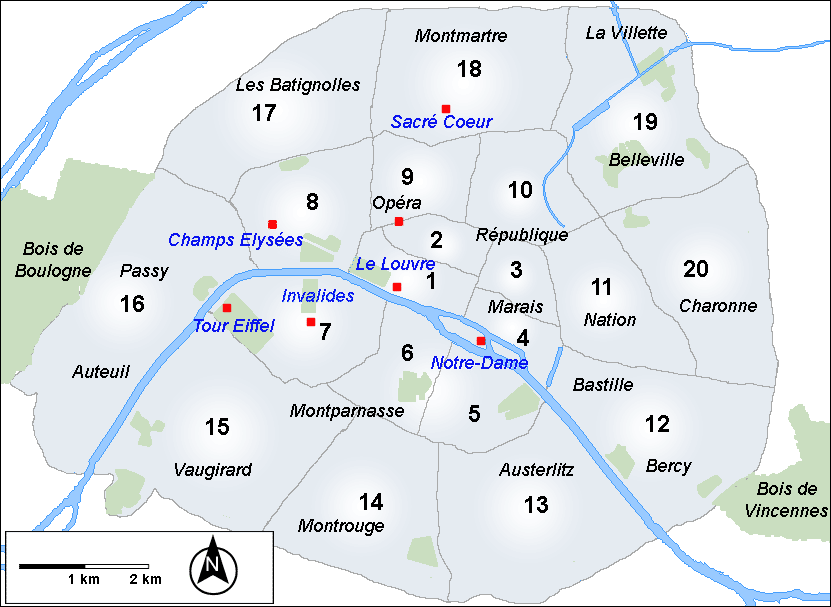 Map of Paris with its 20 arrondissements by Pline, CC BY-SA 3.0, via Wikimedia Commons
Map of Paris with its 20 arrondissements by Pline, CC BY-SA 3.0, via Wikimedia CommonsSafety is also a question of perception. Does Paris feel safe?
To me it mostly does, and I visit regularly (it’s only three hours from my home in eastern France). BUT – I'm French, and speak French fluently, which does make a difference when it comes to feeling confident.
But to some of my non-French friends (and even a few French ones), there are neighborhoods to avoid, at least at night.
If you’re from Tokyo or Abu Dhabi, two of the safest cities in the world, you might feel unsafe in some parts of Paris. But if you're from a megacity with a high crime rate, you'd probably consider Paris a haven of serenity.
So let’s take a look at the reality on the ground. I won't try to whitewash it: Paris isn't dangerous for tourists, but neither is the French capital a perfectly safe place where you can flash your cash without concern.
If you live in Paris, you can shrug most of this off because you'll have an ingrained understanding of your surroundings. But if you're a visiting foreigner, and you don't speak the language, and you don't know the city intimately, then what follows is worth knowing.
The 3 main neighborhoods a tourist should avoid in Paris
Most large tourist destinations attract scores of visitors, both tourists and those intent on preying on them. That said, no way should you deny yourself the joy of a visit just because a few parts of the city are less safe than others.
You just have to be aware of two things.
First, when you're in crowded tourist areas, notice your surroundings and be careful with your belongings.
And second, avoid the more sensitive areas of the city.
Like these.
1. 10th arrondissement
Train stations are often located in seedy areas, and Paris is no different, with the 10th district of Paris boasting not one, but two major stations: the Gare de l’Est and the Gare du Nord.
Many major train lines start or finish here so there's every chance you’ll be using them at some point.
In daytime, these areas are perfectly fine, and I’ve taken plenty of trains from here. But at night, drunks and people selling or high on drugs crawl out of the woodwork, and their acting out – including the occasional fight – can make you uncomfortable.
There's no particular danger here, but the atmosphere is not necessarily serene.
HOW TO PRONOUNCE...
Arrondissement (district) and banlieue (suburb on the outskirts of Paris)
2. 18th arrondissement
One of the areas with the highest crime rates is also one of the most popular: Montmartre, or the 18th. It's an exciting area which was once dedicated to artists.
But below Montmartre, around the Place de Clichy and its neighboring streets, is the area known as Pigalle.
My mother would avoid it and warn me about it many years ago – it is, after all, a red light district.
The former seediness remains, what with its erotic shops and sex shows, but it has become much tamer, with families gathering around park benches on traffic islands and young people pedaling by on bike lanes.
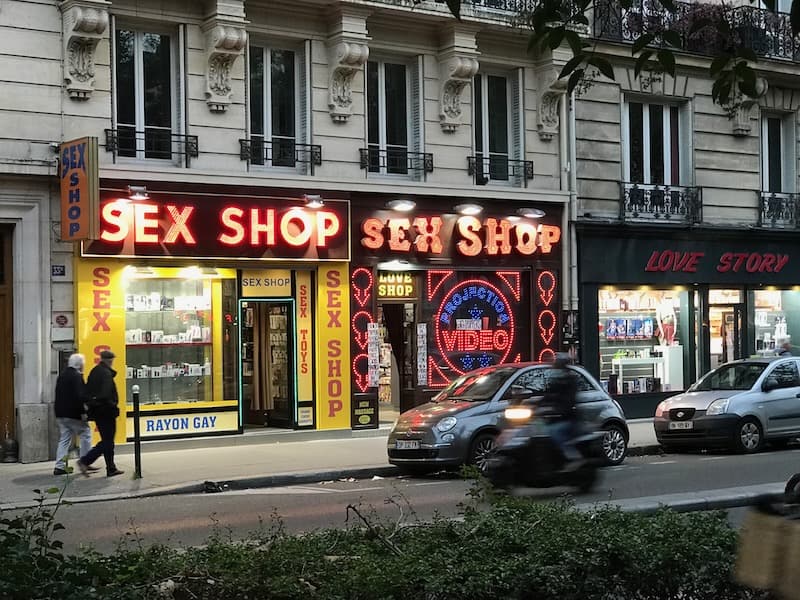 Area around Pigalle, in the evening ©️OffbeatFrance/Leyla Alyanak
Area around Pigalle, in the evening ©️OffbeatFrance/Leyla AlyanakA lot of people warn against coming here but I'll have to go against the grain.
This is where I stay when I'm in Paris, and it has one of the city's typical bouillon restaurants which once fed the working classes of Paris (and where you can still get an excellent meal for a very decent price).
Plenty of Paris food tours start in this area, and there are plenty of good and inexpensive eateries.
Hungry in Paris? You'll be even hungrier after reading these books!
➽ A Table in Paris
➽ Eating and Drinking in Paris
➽ Paris by Ladurée
Just be aware that Pigalle, as a red light district, has many establishments designed to part you from your cash. There are plenty of stories of unsuspecting tourists whose exorbitant bar or club bills have required emergency assistance from friends and family, not to mention police.
If you're uncomfortable in this environment, then avoid it later at night.
In the arrondissement’s northern part, however, it’s a different story, and the closer you get to the ring road, the worse it gets.
At night (and I’ve stayed in this part of town), stepping off the bus or emerging from the last Métro can be daunting, especially if you’re a woman on your own. Stay away from subway stations like Marx Dormoy, Porte de Clignancourt and Porte de la Chapelle.
Other neighborhoods you might avoid in this arrondissement are Barbès-Rochechouart (on the border of the 9th, 10th and 18th) and the Goutte d’Or, where the drug trade isn't unknown.
Other than Montmartre, the other reason you might come here is to visit the fabulous Puces de Saint-Ouen, one of the best flea markets in the world. It's a good thing it operates in daytime, because the area is a little less welcoming at night.
3. 19th arrondissement
Right next to the 18th is the 19th district, another arrondissement that is better in daytime than at night.
During the day, it’s highly diverse, with a mixture of residents from all corners of the world giving it a wonderful global vibe. There are also lovely parks here, like the Buttes-Chaumont.
Mouzaïa has a leafy village-like vibe, cobblestones and all, and if I had the money, this is where I'd live in Paris.
A little further afield is one of my favorite pieces of architecture in Paris is the Rotonde de La Villette, by 18th-century neoclassical architect Claude Ledoux, who also built the most unlikely Royal Saline of Arc-et-Senans near the Jura Mountains.
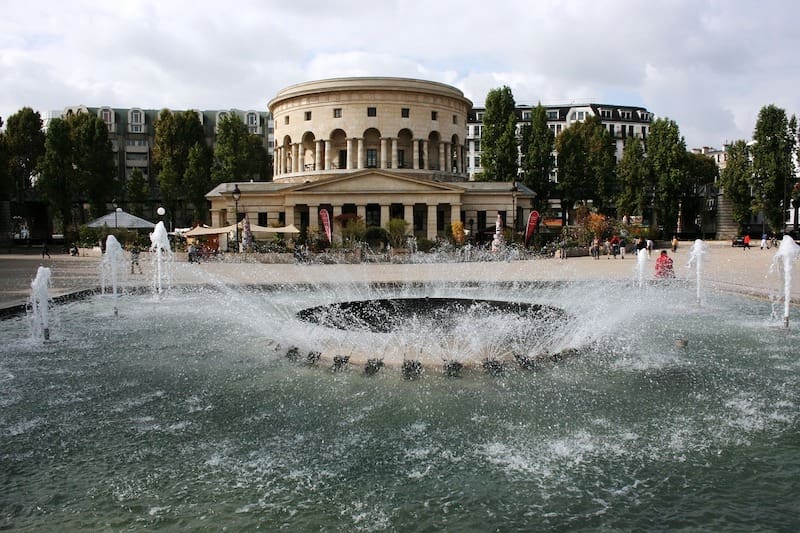 The Rotonde...
The Rotonde...All these areas should be avoided at night. During the day, you'll probably feel a little uncomfortable if you wander along the aerial subway: beneath it, many homeless people live in tents, and there's a brisk trade in stolen goods.
Other areas that require a few precautions
1st arrondissement
The first district is the “main” tourist arrondissement of Paris, by and large a safe area: it is the one that houses the Louvre Museum and the Tuileries. You’ll find plenty of tourists here, but your biggest challenge will be avoiding pickpockets and purse snatchers.
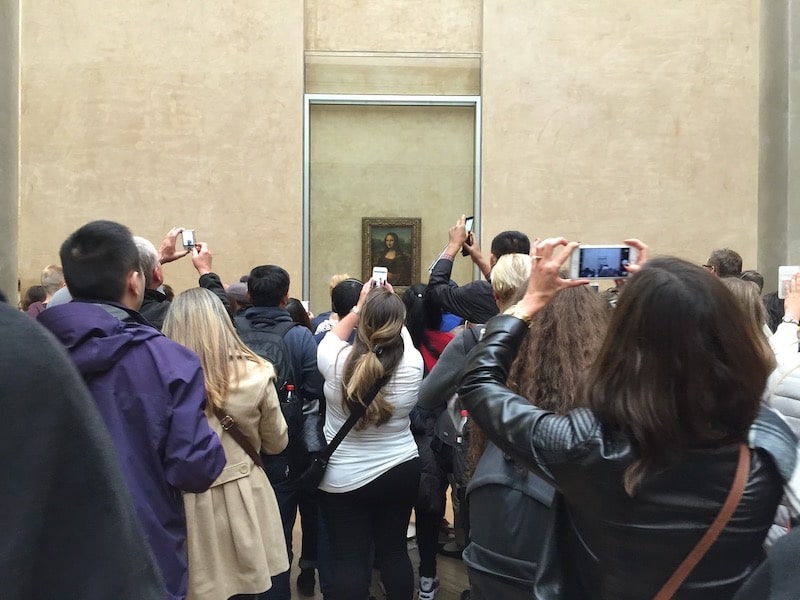 Situations like these, with crowds paying attention at anything but their belongings, are targeted by pickpockets on a daily basis ©️OffbeatFrance
Situations like these, with crowds paying attention at anything but their belongings, are targeted by pickpockets on a daily basis ©️OffbeatFranceAs far as physical safety, the area around the Centre Pompidou and Les Halles, the indoor shopping mall built on the city’s former market, is fine in daytimem with plenty of excellent restaurants nearby and lots of crowds.
However, on Saturday nights, Les Halles becomes a no-go area as young men from the suburbs ride into town to hang out.
The Chatelêt-Les Halles metro station is also in this arrondissement and it is huge, possibly the largest underground station in the world, with interminable corridors that can be downright spooky if few people are around. I try to avoid it once commuters have gone home, but even in daytime, I’ll keep an eye on my belongings.
Getting granular
A number of arrondissements in Paris are largely fine, but the occasional street or block or two should be avoided at night, or precautions taken.
The 20th arrondissement
Take the 20th, a mixed bag, with village-like corners mixed in with social housing and plenty of ethnic diversity. You’ll have good reasons to come here: the Père Lachaise Cemetery, and street art in Belleville, also highly diverse (and slowly gentrifying).
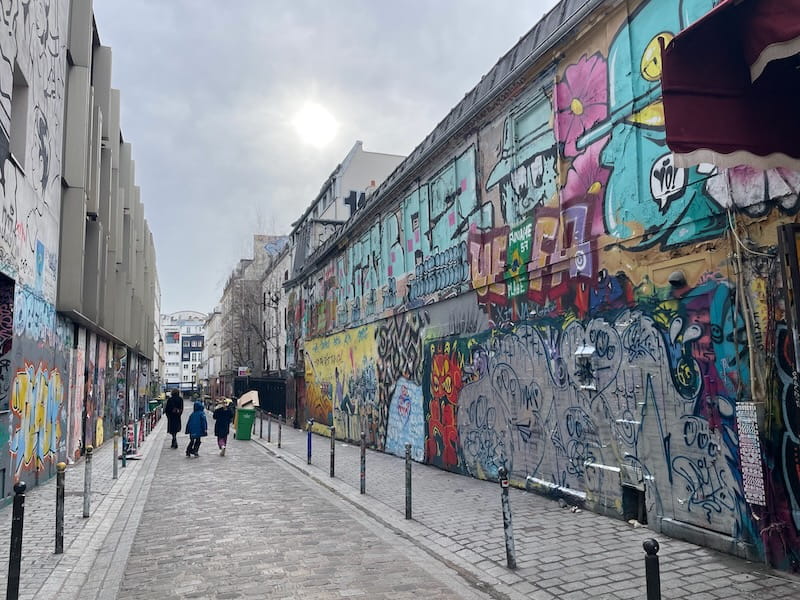 Belleville has plenty of street art, a bit like the St Julien area of Marseille ©OffbeatFrance
Belleville has plenty of street art, a bit like the St Julien area of Marseille ©OffbeatFranceYet some travel guides and a number of visitors say it is one of the more dangerous districts in Paris. If you're a woman on your own, I'd avoid Belleville at night but it's rapidly becoming gentrified, with plenty of eateries and lots of offbeat places.
I'm not convinced this is one of the "dangerous neighborhoods" in Paris.
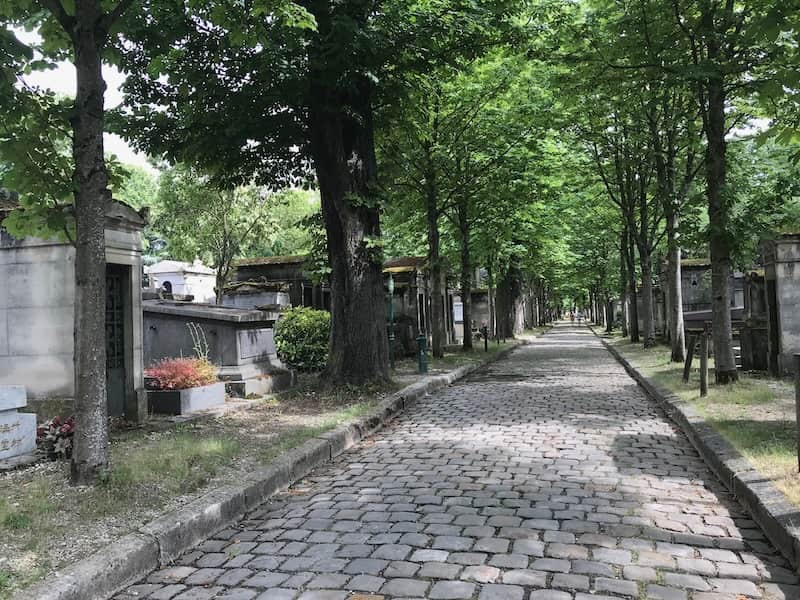 Père Lachaise cemetery, perfectly serene in the 20th arrondissement ©OffbeatFrance
Père Lachaise cemetery, perfectly serene in the 20th arrondissement ©OffbeatFranceThe woods
At night you should definitely avoid the two forests, the Bois de Boulogne in the chic 16th and the Bois de Vincennes in the 12th. Both areas are pleasant in daytime but at night, sex workers inhabit the woods and the atmosphere is what you might call “chaude”, or hot.
The Métro
As in any big city, the subway should be approached with caution at night. I’ve mentioned a few stations to avoid, and you can add Château-Rouge, Gare du Nord, Strasbourg St-Denis, Réaumur Sébastopol and Montparnasse Bienvenue to the list.
Frankly, at night, I'm cautious in any subway station that starts with a “Porte” when I’m by myself…
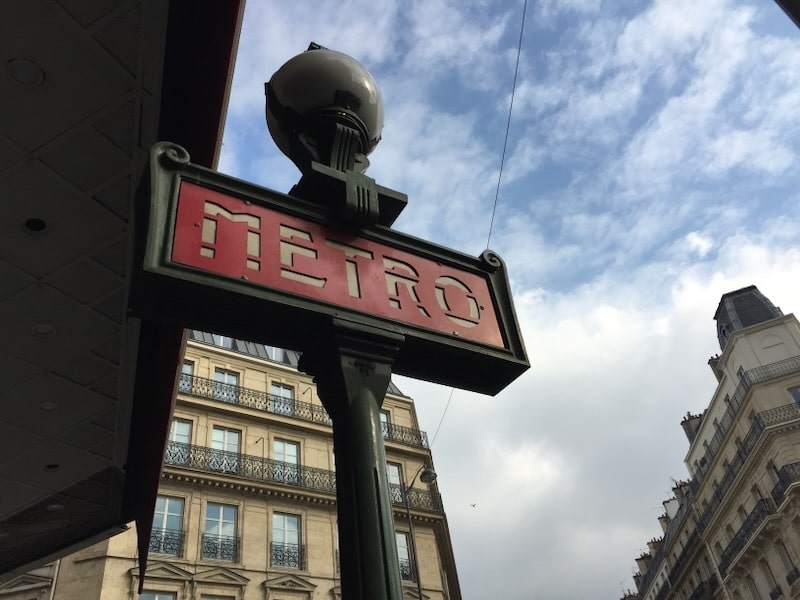 A metro sign in Paris ©️OffbeatFrance
A metro sign in Paris ©️OffbeatFranceWhat kind of crime is there in the city center?
One important thing to note about crime in Paris: it is rarely violent. When things do turn bad, it’s usually due to drug dealing or criminal gangs settling scores. Most times, this kind of violent crime doesn’t take place around heavily policed tourist sites and rarely targets tourists or tourist areas.
As I’ve mentioned, the most common crime against tourists in the city of Paris is pickpocketing, especially at popular sites, like the Eiffel Tower or the Sacré-Coeur Basilica, or on popular public transportation lines, such as those arriving from Charles de Gaulle airport.
Pickpockets are often hard to spot, because they might be women, or children (this is common because minors are harder to prosecute), or groups dressed to look inoffensive. They tend to target your purses, wallets, cellphones or jewelry, hence the importance of leaving your valuables behind or using a reliable theftproof purse (I use a crossbody anti-theft Pacsafe bag, which I wear across my chest, not dangling temptingly behind my back).
Another unsettling issue, especially if you're a younger woman, concerns sexual harassment on the street, which you might encounter where groups of young men gather, especially in the evening.
It rarely goes beyond words and whistles, but even these can be extremely disquieting if you're a foreigner, alone, and don't speak the language.
In addition to crime, there is occasional social unrest in Paris. If riots do erupt during your stay, a rare occurrence, make sure you stay informed through your hotel staff or on social media. Riots tend to take place in the suburbs rather than in the heart of Paris, mostly because of the extensive police presence in the city center.
It’s easy to worry about violence, especially when you hear of a terrorist attack, but remember, violent acts against tourists in Paris remain the exception.
Is Paris more dangerous than other cities?
No, it isn’t.
According to the 2023 Global Peace Index, France as a country is 67th in terms of peace and security out of 193 countries. Not great, but better than average.
As for Paris, statistics vary depending on where you look.
For example, Numbeo, which relies on people’s reports, gives Paris a 57.43 crime index, considered moderate, and a 42.57 safety index, which is also average. These numbers are on a par with figures for France generally, placing Paris more or less in the middle. London, for example, has a slightly lower crime index (54.00) and a slightly higher safety scale (46.00).
More stats? According to Armormax (they sell armored cars), Paris ranks 15 out of 25 European cities for crime, but most of it is petty, as in pickpocketing.
In the World Population Review, Paris ranks 23rd on the list of 60 cities when it comes to safety, sandwiched between Brussels and Taipei.
The reason I point to all these statistics is that 1) they all differ slightly and 2) they all confirm the trend that Paris, on any safety scale, ranks around the middle.
Safety tips in Paris
While we’ve covered the main threats above, I’d like to highlight a few common dangers (and some common scams):
- When you book a place to stay, make sure you find out what it’s like at night by reading reviews on such sites as booking.com and doing research. A perfectly acceptable area in daytime can become less so at night.
- Rather than hop on the bus or subway late at night, especially if you're alone, opt for a taxi or Uber. And avoid walking alone at night unless you're in a crowded or touristy area. But that's just common sense...
- This is obvious, but keep an eye on your belongings, whatever the time of day. Better yet, leave anything of value at home. No flashy jewelry, no wads of cash, and try to look like you know where you're going.
- Use something safe to carry what you do need. Some people use a backpack (carried on the front) but I prefer one of these cross-body anti-theft bags. I'm also trialing this stylish sling bag.
- For men (and for women who like these), one of my male readers recommends this RFD money belt, which comes in a variety of colors. And this slim front pocket wallet will keep a couple of cards and a bit of cash a lot safer than in your rear pocket.
- Avoid people who come up to you, especially if they’re holding a clipboard. This is a favorite scam to catch your attention while someone else does the dirty deed. If you’re asked for something, like a light or directions, simply say no thank you, smile, and keep walking.
- It's not a good idea to use your cellphone in the metro, especially near the door. Snatching it through the open doors just before they close has become something of an art form, and there’s nothing you can do once those doors have closed. You’re headed away from the station and someone on the platform is the proud owner of your mobile phone… If you must use your cell, make sure it's tethered with a wrist strap (I use this one, and it does make a difference).
- And finally, take care when shopping! Please don’t leave your credit cards or purse sitting on a counter…
FAQ
Is Paris safe for tourists?
Is Paris safe for tourists?
Which areas of Paris should I avoid at night?
Which areas of Paris should I avoid at night?
Parts of the 10th, 18th, and 19th arrondissements are less safe after dark, especially around train stations and Pigalle. Use common sense and stay in well-lit areas.
Is the Paris metro safe at night?
Is the Paris metro safe at night?
Avoid traveling alone late at night in less busy stations. Consider taxis, rideshares, or staying in central, busy areas.
What crimes should I watch out for?
What crimes should I watch out for?
Pickpocketing is the most common threat. Beware of scams targeting tourists and keep valuables secured.
What are the safest areas to stay in Paris?
What are the safest areas to stay in Paris?
The 7th, 8th, 15th, 16th, and 17th arrondissements are generally safest. Even in these areas, remain aware of your surroundings.
Are Paris suburbs (banlieues) safe to visit?
Are Paris suburbs (banlieues) safe to visit?
Most are fine during the day, especially if there’s a tourist attraction. Avoid unfamiliar suburbs at night unless necessary.
Are there any parks or woods to avoid at night?
Are there any parks or woods to avoid at night?
How can I protect myself from pickpockets?
How can I protect myself from pickpockets?
Use an anti-theft bag, keep wallets in front pockets, avoid flashing valuables, and stay aware in crowded areas and on public transport.
Should you worry about dangerous areas in Paris?
Just choose your neighborhoods wisely, take care of your belongings, and be aware of your surroundings – treat crime in Paris exactly as you would any large city back home. And if you're feeling vulnerable, consider taking a few short day tours to get comfortable with the City of Light before setting off on your own.
Paris is full of beauty and romance, and there's every chance you'll spend several weeks here without witnessing a single unpleasant incident.
So enjoy yourself, visit every place on your list, and take home unique memories that will last you a lifetime.
Essential resources for your Paris trip
BOOK YOUR ACCOMMODATIONS
I use booking.com, because they include both hotels and holiday rentals like Airbnb or VRBO, so a wider choice and an easy cancellation policy.
DO YOU NEED A SIM CARD FOR FRANCE?
If you haven't signed up for a roaming service back home and have an unlocked phone, consider getting an e-SIM for France. Here's the one I use when I travel.
IF YOU'D LIKE TO READ UP ABOUT PARIS AND FRANCE
Drop by my long list of books about France, written by French or foreign Francophile authors, with plenty specifically about Paris.
AND DON'T FORGET YOUR GUIDEBOOKS!
➽ Lonely Planet's Paris Travel Guide
➽ Rick Steves' Paris
➽ Paris in Stride - An Insider's Walking Guide
A FEW WORDS ABOUT SAFETY
Paris is as safe as any major European city but you WILL find pickpockets in Paris. I keep them at bay by using a comfy anti-theft purse or an infinity scarf with a zipper to hide my cards and money.
Did you enjoy this article? I'd love if you shared it!

